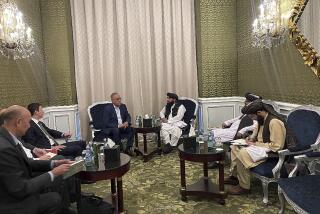Women Open Forum With Protests
HUAIROU, China — Undeterred by an isolated setting, strict government restrictions and afternoon rain, more than 20,000 women attending a non-governmental forum here Thursday managed more free expression in their first full day of meetings than has been seen in China since the 1989 demonstrations in Tian An Men Square.
Defying a government ban, a small group of Tibetan exiles showed a film depicting imprisonment of Tibetan nuns and forced sterilization of Tibetan women. When two plainclothes Chinese security agents attempted to confiscate the film “for safekeeping,” they were surrounded by 20 women and forced to return it.
The forum, made up of representatives from a range of women’s interest groups, overlaps with the more formal U.N. Fourth World Conference on Women that starts Monday in Beijing.
Outside a cinema meeting hall Thursday morning, 15 foreign representatives of Amnesty International held up photographs of 12 women, including two Chinese, who they claimed were victims of human rights abuses.
The demonstrators, who later showed a film that included an interview with a jailed Tibetan nun and an exiled Tian An Men Square protester, ignored the megaphone plea by a Chinese policewoman to move to a designated protest ground.
*
Meanwhile, in a school ground meeting site, a Japanese women’s group unfurled a banner and distributed petitions protesting nuclear testing by France and by China, which recently detonated a nuclear device in its western region.
“Somebody warned us that we could be arrested for this,” said a smiling Toshiko Ishimaru, 41, with the Women’s Democratic Club of Japan, which staged the protest.
Such defiant outbreaks of free speech and criticism of Chinese policy were just what officials feared when they decided to move the Aug. 30-Sept. 8 Non-Governmental Organizations Forum on Women to this sleepy suburb about 35 miles north of Beijing on the edge of the Great Wall of China.
But by keeping the meetings well away from the main Chinese public, the government has managed, so far, to limit the potential political spillover. For the most part, the Chinese press has played down the women’s meeting.
The official People’s Daily newspaper noted the opening of the meeting in an article on its second page. Television, meanwhile, concentrated on the singing and dancing in the opening ceremonies.
The isolated setting and afternoon showers failed to dampen the enthusiasm of forum delegates, whose numbers are expected to swell to 30,000 next week. Women danced, sang, argued, embraced and generally celebrated. More contentious issues such as abortion and reproductive rights were reserved for later in the conference.
Instead, delegates renewed old friendships, networked for new contacts and met in hundreds of workshops on topics ranging from teen-age eating disorders to the implications for women of the O.J. Simpson double murder trial.
Dazon Dixon, founder of the Atlanta-based group Sister Love Inc., said the idea behind the heavily attended workshop “O.J. Simpson: Black Women Speak on Black Men, Violence and Interracial Relationships” was to examine “the fine line black women walk between race and gender” in the Simpson case.
As an African American, Dixon said, she is sympathetic to the plight of a black man on trial in a predominantly white criminal justice system. But as a woman, she is also sympathetic to the female victim in the crime, whether the assailant is black or white. Both victims in the Simpson case were white.
*
The tone of the 10-day conference was set Thursday by a videotaped keynote address by Nobel peace laureate Aung San Suu Kyi, from Myanmar (formerly Burma), that was smuggled into the conference. Myanmar’s military junta maintains close ties with the Chinese government. Myanmar’s official delegate to the U.N. women’s conference is a male army general.
“Without tolerance,” Suu Kyi said in her recorded speech, “the foundation for democracy and respect for human rights cannot be strengthened, and the achievement of peace will remain elusive.”
The most glaring absence at the conference was large numbers of Chinese delegates, who were outnumbered even by Chinese security guards. Those who did attend remained generally in the background.
More to Read
Sign up for Essential California
The most important California stories and recommendations in your inbox every morning.
You may occasionally receive promotional content from the Los Angeles Times.










